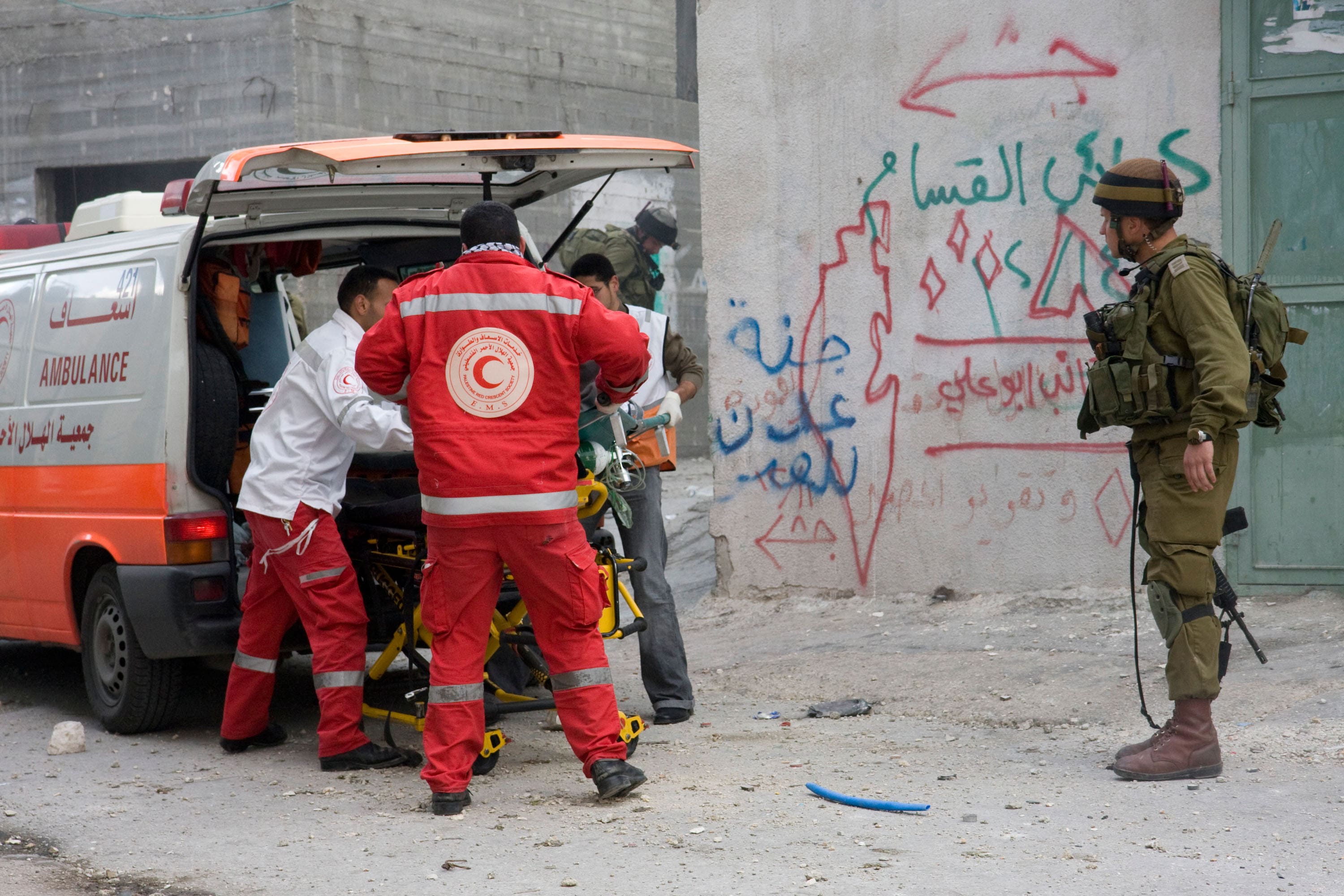
A new popular Palestinian uprising would overwhelm an already suffering Palestinian health sector in the West Bank and Gaza. This would be exacerbated by the Israeli regime’s ongoing blockade of Gaza and increased fragmentation of the West Bank, which have dealt a significant blow to the types of grassroots community mobilization efforts around health that enabled Palestinians to resist Israeli suppression during the First Intifada. Furthermore, a new intifada would shift the Israeli and international community’s approach to Palestinians, restricting health providers’ capacities and access to desperately needed medical resources.
Consequences of Israeli Suppression
In the event of a Palestinian uprising, Israel would undoubtedly respond with intensified repression alongside a continued escalation of violence. This would include closures of cities across the West Bank, as witnessed in Jenin, Nablus, and Jericho in early 2023, causing substantial damage to Palestinian health in multiple ways.
Firstly, healthcare providers who live outside cities where most hospitals and healthcare facilities are located, would be prevented from entering closed-off areas, or they would experience hours-long delays at checkpoints. Secondly, patients in cities under closure would be unable to leave for care elsewhere, and patients outside of cities would be blocked from reaching medical facilities. As a result, providers based in cities would bear the brunt of delivering care that would otherwise be shared with providers who commute to cities. Moreover, healthcare personnel unable to access their workplaces may lose their jobs.
Thirdly, Israel may also close entryways surrounding Palestinian villages, denying villagers access to main roads. Moreover, increased checkpoints and other physical barriers like dirt mounds and ditches would limit their ability to travel for care throughout the West Bank, or cause significant delays, potentially resulting in mortality. Fourthly, trucks carrying humanitarian goods or personnel would also face similar movement restrictions, and patients who are able to access care may arrive at facilities that lack the resources needed to treat them. Undeniably, there would be increased reports of more childbirths at checkpoints, blocked ambulances, and drug shortages.
The Israeli response would not be limited to movement restrictions. It would also include a violent military response that would take different forms across Gaza and the West Bank—and potentially in 1948 territories, if Palestinian mass mobilization spreads as it has since the 2021 Unity Intifada. Any action by Palestinian groups in Gaza would be met initially with Israeli bombardment, and potentially a ground invasion, while even non-violent mobilization efforts at the Gaza border would result in many casualties, as was seen with the Great March of Return. The West Bank would likewise see increased Israeli raids, extrajudicial killings by Israeli occupation forces, and more dangerous encounters with Israeli settlers, who would also likely mobilize in the face of a Palestinian uprising.
All of these events would lead to a sharp increase in trauma-related injuries among Palestinians, but trauma care remains lacking in Gaza and the West Bank. As a result, Palestinians in Gaza will suffer from more frequent and potentially unnecessary amputations and other disabilities, and mortality would increase as a result of lack of access to care or through secondary causes, such as infections received at hospitals.
Furthermore, the mental health strain of an Israeli military response to a Palestinian uprising would be incalculable. Aside from the mental distress caused by witnessing or experiencing violence directly, the inability of families to safely gather, the trauma of constant surveillance at checkpoints and by drones, and the overall uncertainty of knowing how or when the situation will end, would create a mental health burden similar to what was seen after the Second Intifada, especially among children.
The International Response to a Palestinian Uprising
In the event of a new Palestinian uprising, the Palestinian Authority (PA) would undoubtedly intensify its security measures to suppress it, as it has repeatedly done, with significant pressure from the international community. In January 2023, for example, and in the face of one of the deadliest periods in the West Bank in more than a decade, the US Secretary of State pressed PA President Mahmoud Abbas to implement a security plan drafted by the US government, including the training of a special Palestinian military force, with little attention paid to the significant humanitarian toll on the population.
The PA security budget is already inflated compared to other sectors like health. A new uprising would only exacerbate this imbalance. For example, during the Second Intifada, health expenditure per capita decreased. Any new budget constraints would lead to cuts in the wages of government healthcare personnel, and, thus, potentially to strikes.
To make matters worse, global attention to PA security would outweigh that of the increased health needs of Palestinians. Organizations that provide on-the-ground services, including international ones like UNRWA and Medical Aid for Palestinians, along with local efforts like the Palestinian Medical Relief Society, would issue emergency appeals for aid in an effort to fill service gaps. However, Palestinian NGOs might be at increased risk during an uprising, as demonstrated when Israeli forces raided the Health Work Committees and arrested its director in 2022. Under the pretext of security, Israel could launch a massive shutdown of Palestinian NGOs, including health-related organizations, greatly limiting their ability to function.
Conclusion
Escalation in Israeli and PA repression of Palestinian resistance, and the greater geographic fragmentation of Palestinians that follow, would make it more difficult for Palestinians to engage in health-related mobilization efforts. During the First Intifada, neighborhood committees and volunteer healthcare professionals provided medical services to vulnerable populations, especially in rural areas. But in the post-Oslo period, development in health infrastructure has focused on cities at the expense of a community-based approach to medicine.
Geographic fragmentation and urbanization in the West Bank and Gaza, in addition to an over-reliance on donor aid, continue to limit the potential of such grassroots initiatives. However, local efforts could undoubtedly fill service vacuums and offer care with whatever resources and personnel are available. Indeed, such community mobilization efforts during the First Intifada helped bring Palestinians together around a vision for liberation beyond the technical details of a state-building project. In the event of another uprising, the aspiration would be that short-term suffering may result in a genuine path to future liberation, including a decolonized health system built for and by Palestinians.
Dr. Yara M. Asi is an Assistant Professor at the University of Central Florida in the School of Global Health Management and Informatics. Her research agenda focuses on global health, human rights, and development in fragile populations. She is a Non-resident Fellow at the Arab Center Washington DC, a 2020-2021 Fulbright US Scholar to the West Bank, the Fall 2021 US Fellow at Al Shabaka Palestinian Policy Network, and the co-chair of the Palestine Health Justice Working Group in the American Public Health Association. Along with working at one of the first accountable care organizations in the United States, she has also worked with Amnesty International USA and the Palestinian American Research Center on policy and outreach issues. She has presented at multiple national and international conferences on topics related to global health, food security, health informatics, and women in healthcare, and has published extensively on health and well-being in fragile and conflict-affected populations in journal articles and book chapters. Her work has also been featured in The Washington Post, The Guardian, The Nation, +972 Magazine, The Conversation, Al Jazeera, The World, and other outlets. Her forthcoming book with Johns Hopkins University Press will examine war as a public health crisis.










